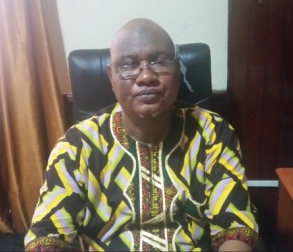AID-Sierra Leone On WASH Sensitization in Koinadugu District
African Development Bank in aiding the Government of Sierra Leone to promote rural development has provided funding for water, sanitation and hygiene projects in five districts in the country – Koinadugu, Kono, Kambia, Pujehun and Bonthe. (Photo: Program Manager, Mr. Amadu Jalloh)
AID-Sierra Leone, a local non governmental organization, has the very important role of sensitizing chiefdoms in Koinadugu district on the importance of taking ownership of the water facilities that the ADB funded project will provide them with.
Speaking with the Program Manager, Mr. Amadu Jalloh in Freetown, he said that their intervention is very important to raising awareness among the people about how to take ownership of the facilities which are theirs and how to manage and operate them sustainably.
He pointed out that the innovation comes from the government’s realization of the mistakes that were made in implementing previous donor projects; wherein the donors came in and without consultation with the people the projects were intended to benefit implemented them with training the people to own them. After a few years, the projects became wrecked with a lot of money having been wasted and nothing left to show that benefits the people.
With this new approach to making grassroots rural people take ownership of development projects meant for them, Mr. Amadu Jalloh said the emphasis is on capacity building through training of the people to take control of maintenance and operation of water facilities.
The aim is to ensure that the people who have these facilities always have safe drinking water, without which they easily contract diseases such as diarrhea, cholera, ‘run belleh’ and typhoid.
AID-Sierra Leone’s work will also cover sensitization on sanitation and the need for people to build their own toilets; noting the relation between open defecation and disease transmission through vectors such as flies, poultry, dogs and rats.
Their work he emphasized is to generate action by the people themselves for their well-being by taking a holistic approach to water, sanitation and hygiene. Towards this, community and school health clubs will be formed.
Committees set up by the people themselves will be taught how to manage the facilities the ADB projects will provide in order to make them sustainable over a period of ten to twenty years.
Each facility will have a caretaker who will be trained in basic repair techniques. Spare parts will be made available. The people will be expected to tax themselves to do repairs and pay the caretaker. Bye-laws will be formulated to protect use of the facilities in order to prevent abuse.
Mr. Amadu Jalloh who has a wealth of experience in community development said the essence of this training is to ensure that after their withdrawal, the people would have been capacitated to not only take ownership of the facilities but to manage them well and sustainably – Hence the emphasis on public engagement, mentoring and training. This, Mr. Jalloh said will reduce the burden on government, which is the essence of decentralization.
By Ranger
Stay with Sierra Express Media, for your trusted place in news!
© 2017, https:. All rights reserved.






